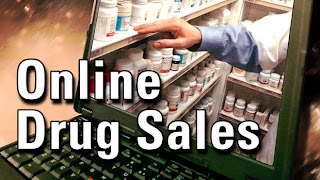Teens, Drugs and Online Pharmacies
There
was a day you gave birth to a child that you believed was your heart and soul
and you would protect that child from all the bad things in this world. From infancy to toddler to elementary school
and hanging that beautiful finger painting artwork up on your refrigerator
door, the joy and pride of parenthood kept growing.
Then
we start the tweenage era. That middle-school itch. The peer pressure, the "where do I
belong" and "who will be my friend" in the lunchroom.
Today
life growing up from a child to a tween
to a teen is escalated by technology of the digital access that kids have
today. It is like they are growing up in
the Jetson generation only hundred times faster. It is advised that parents should have the
"tech talk" with their kids even before the "sex
talk." That is a strong indicator
of the importance of how cyber-life has taken over our lives--both young and
old.
Drug
dealers have figured this out too. Your
teenager can purchase drugs illegally from online pharmacies, unfortunately,
rather easily. According to the Centers
for Disease Control and Prevention, more people in America die from an overdose
of prescription drugs than from heroin and cocaine combined. This is why organizations like
StopMedicineAbuse.org are so important in helping educate parents to the issue
of a teen's access to narcotics and other drugs both in your home and online.
Digital Citizens
Alliance
released a new study that 31% of students take prescription drugs to get
through finals. That is 1 in 3 students
that obtain these drugs without prescription from a doctor. 15% of students have or have a friend that
have ordered these drugs online and 71% of these students parents believe it is
common for students to share prescription drugs.
Prescription
drug use and over the counter medicine use is an issue that we need to take
very seriously and it starts from the moment your child is old enough to have
their own keypad; whether it comes in the form of a cell phone with a data plan
or a computer or tablet. They are now
potentially open targets to online drug dealers in combination with peer
pressure.
Most
parents know that communication is key to
prevention. Keeping an open dialog
with your child is crucial in helping them with peer pressure and making
choices that can affect their future.
Let's
look at some tips that parents may not be as familiar with:
Do you know what your teen is saying? Listen or watch on texts or emails for code words for
certain drug lingo. Skittling, Tussing, Skittles, Robo-tripping, Red
Devils, Velvet, Triple C, C-C-C-, Robotard are some of the names kids use for
cough and cold medication abuse. Weed, Pot, Ganja, Mary Jane, Grass,
Chronic, Buds, Blunt, Hootch, Jive stick, Ace, Spliff, Skunk, Smoke, Dubie,
Flower, Zig Zag are all slang for marijuana. Go online for the Teen Drug Slang Dictionary.
Monitor,
monitor, monitor. Especially if you suspect your teen is using
substances, it is imperative you closely monitor their digital activities. Their computer history, cell phone calls and
text messages (and remember, you are paying the bills, you can have the phone
as well as their passwords), as well as who they are hanging out with both
online and off.
Leftovers. Are there empty medicine wrappers or
bottles, burn marks on their clothes or rug, ashes, stench, etc in their room
or if they own a car, in their car? Teens either take several pills or smash them so all of it
is released at once. Be sure to check
all pockets, garbage cans, cars, closets, under beds, etc. for empty wrappers
and other evidence of drug use. Where
are your prescription drugs? Have you
counted them lately?
Online pharmacies and YouTube.
Online pharmacies are a huge concern for parents of teenagers. RYAN's Cause is a tragic example of how easy it
is to obtain illegal drugs online and the deadly consequences. Did you
know that Google was
under criminal investigation for aiding and abetting the sale
of illegal drugs and eventually paid half a billion dollars to settle the
case ?
Now
state Attorneys General are looking into Google's role in continuing to make
money from this illegal and dangerous online commerce. Attorney General
Hood said that the violators were easy to find, "On
every check we have made, Google's search engine gave us easy access to illegal
goods, including websites which offer dangerous drugs without a prescription,
counterfeit goods of every description," he said. Teens are savvy, and so are the drug
dealers. Leave a door open, and they will find a way in.
Although Google claims to have rectified this issue, Digital
Citizens Alliance (DCA) alleges that
Google is still allowing access to the illegal pharmacies that
peddle these drugs through YouTube, which is owned by Google. They say that Google continues to make money from
this activity by selling ads to legitimate brands that show up on YouTube.
Though Google may say that its policies prohibit illegal videos
that help teens or others gain access to illegal drugs without prescriptions, the
truth is that Google
has very little incentive to take down this content
that drives traffic to YouTube, especially YouTube mobile. Bloomberg reported that YouTube
revenue tripled in the past six months due to increase mobile advertising
sales. We all know how teens love their cell phones and how much time
they spend on YouTube.
In fact, a recent
study said that 93% of teens check YouTube each week. With
a that high of a percentage of teens on YouTube the risk of your teen stumbling
on an online pharmacy ad is probably high. Learn more about this.
It is worth your time.
Be
an educated parent, you will have safer and healthier teens.


